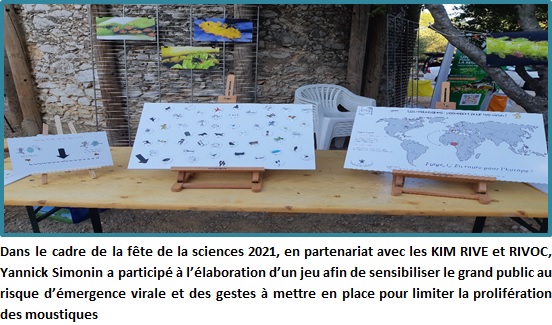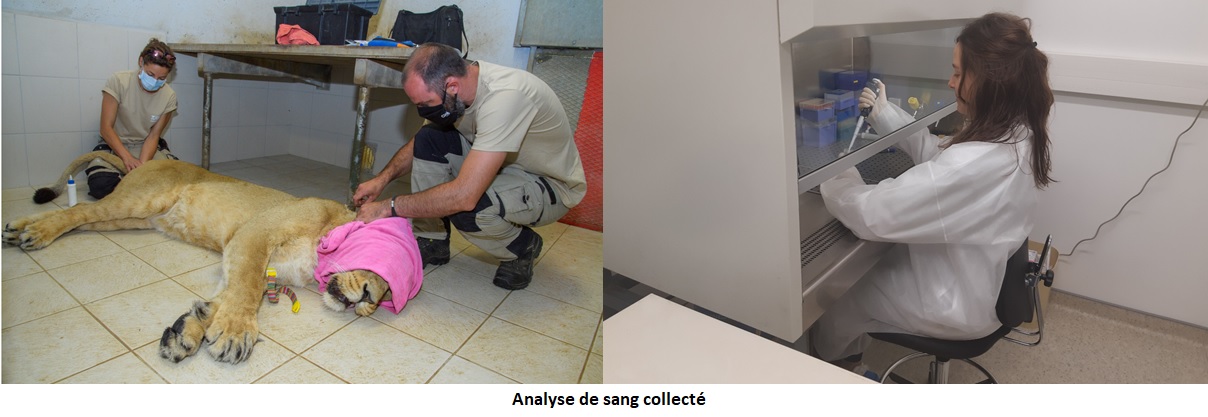Zoom: Yannick Simonin - Lecturer and head of the "Infection Biology" Master's program
Yannick Simonin is Senior Lecturer and head of the "infection biology" Master's program at the Montpellier Faculty of Science, and leads the "Neuroinfection and EmeRging VirusEs" working group at INSERM PCCEI.
As part of the ARBOSUD - MUSE program, his research group is studying the monitoring and circulation of zoonotic viruses, particularly those transmitted by insect vectors in the Montpellier region, but also in certain African countries, notably Burkina Faso.
 Zoonoses are diseases initially transmitted to humans by animals. It is estimated that over 75% of emerging diseases are of zoonotic origin. They therefore represent a real public health problem, as is currently the case with the COVID pandemic, for which the virus responsible, SARS-CoV-2, most probably originates from bats, which are thought to be its natural reservoir.
Zoonoses are diseases initially transmitted to humans by animals. It is estimated that over 75% of emerging diseases are of zoonotic origin. They therefore represent a real public health problem, as is currently the case with the COVID pandemic, for which the virus responsible, SARS-CoV-2, most probably originates from bats, which are thought to be its natural reservoir.
Zoonoses include vector-borne diseases, i.e. diseases transmitted by hematophagous arthropods (insects that feed on vertebrate hosts, such as ticks and mosquitoes). These diseases are known as arboviroses, and the viruses responsible are arboviruses. These include the Dengue, Chikungunya and Zika viruses.
"A vector-borne disease is transmitted by a vector, often a blood-feeding arthropod such as a mosquito. By biting an infected person or animal, it ingests the parasites, viruses or bacteria contained in the blood. After an incubation period of a few days, the infected insect can transmit the pathogen to a healthy person through another bite.
The origin of the introduction of a new vector-borne disease can be multiple. For some diseases, such as WestNile virus and its cousin Usutu virus, migratory birds are responsible for the arrival of these viruses from Africa. Not only humans, but also certain pets such as dogs and horses (especially those from the Camargue region) can be infected by mosquitoes that bite sick birds. The Occitanie region is particularly exposed to the risk of spreading vector-borne diseases, due to its geographical environment and high urban density. The Camargue region and its wild environment, home to many migratory species, provide an ideal environment for mosquitoes to thrive, and consequently for the risk of vector-borne diseases. These diseases are on the increase in the region, but also more generally in the south of France and Europe, hence the need to set up local surveillance networks. Dengue, West Nile, USUTU and Chikungunya virus infections have been detected in Occitane in recent years.
Individual mosquito control is the order of the day in our region as the warm weather approaches. We all need to be vigilant, and follow the recommendations of EID méditerranée (entente interdépartementale pour la démoustication du littoral méditerranéen), which recommends avoiding the presence of stagnant water near our homes.
Monitoring the circulation of these arboviruses would enable us to anticipate, or even limit, the emergence of new epidemics. Yannick Simonin and his team are working closely with the Montpellier Zoo. Indeed, zoos are an open-air laboratory where a wide variety of species can be found, sentinels of the presence of numerous viruses in our region. His group is focusing in particular on monitoring 2 emerging arboviruses: WestNilevirusandUstu virus. These 2 viruses are likely to have an impact on the human nervous system, reaching the brain and causing potentially serious inflammation. It is therefore important to know more about their circulation in the regions most at risk. In collaboration with CIRAD, its team has just published a study monitoring the presence of these viruses in our region, not only in humans, but also in mosquito vectors and various animals (dogs, horses, birds). This is what is known as the "One health" concept, which consists of implementing a collaborative, multi-sectoral and transdisciplinary approach, in particular to anticipate the risk of new diseases emerging, a highly important subject in the light of recent events....
Since the COVID pandemic, the surveillance reflex has been triggered... And what if Covid was just the tree that hid the forest?

